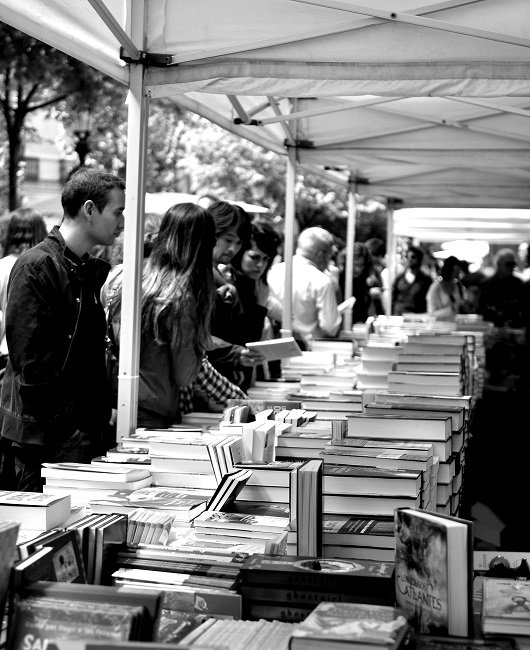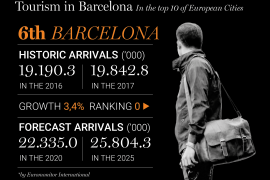[dropcap letter=”T”]
here is some degree of consensus in the publishing industry regarding the economic recovery, although there is also unanimity that things will never be the way they used to be back in the flush times. The Penguin Random House offices are bustling with activity, and the editorial director, Claudio López Lamadrid, welcomes us in his book-filled office: “This is a good time because we have overcome an incredibly profound and deeply systemic crisis which has lasted a long time and caused the market to contract by 40%. It has begun to recover in the past two years and is now growing, slowly but still it’s growing… This will be the third year of growth, so I think that we can finally say that the crisis is over.”
In the opinion of Maribel Luque, a literary agent at the mythical Agencia Balcells, “the situation is worrisome. There is too big a gap between the two leading groups in the sector with increasingly large market shares and the small independent publishing houses. The editors at the large groups are under heavy pressure from their financial directors and essentially publish books which are sure to be commercial successes, while the small independent publishers are more adventurous. Unfortunately, oftentimes the infrastructure and wherewithal of the small ones prevent them from going as far as they want to, but those that manage to do so play an extremely important role both culturally and by contributing to the diversity of published products. This problem is not intrinsic to the Spanish publishing sector but affects everyone. And the worst part is that these circumstances mean that fantastic books remain unpublished… or even unwritten!”
“Technological changes, the speed at which information circulates, the multiplication in ways to access knowledge and entertainment… many things are transforming our sector and the editor’s job. However, it essentially remains the same: to make the works of must-read authors accessible to readers”, states Silvia Sesé from Anagrama. “Editors are one-man orchestras”, says Malcolm Otero Barral from Malpaso. “In the past they used to decide and select, but now they have to do anything and everything: social media and promotion, keeping in close touch with the media, spending much more time with the booksellers so they know you and give your authors room. You’ve got to carve a niche for yourself. You have to do more to make sure your books survive”.
What is called the “Netflix model” has transformed the underpinnings of cultural consumption on screens. This model is based on the Triple A’s: accessibility, affordability and attractiveness. “Netflix is the most important publisher of the 21st century”, Celaya reflects
“The fundamental change”, in López Lamadrid’s opinion, “is proximity with the end reader. Now you can target a very specific sector, such as readers of thrillers, whereas in the past you would launch a campaign that reached everyone. This is why the obsession in marketing today is to get reliable databases”. However, in Otero Barral’s opinion, “what’s missing is the contract with the reader. We always have the booksellers as a filter, serving as high-quality intermediaries.”
The new technologies and changes in reading habits are unquestionably factors which are keeping the industry watchful and constantly adapting. In 2004, Javier Celaya set up the company Dosdoce with the intention of giving the publishing industry resources to adapt to the digital ecosystem. And now he has opened a branch of the Swedish company Storytel in Barcelona, which offers audio books by subscription. What is called the “the “Netflix model” has transformed the underpinnings of cultural consumption on screens. This model is based on the Triple A’s: accessibility, affordability and attractiveness. “Netflix is the most important publisher of the 21st century”, Celaya reflects. “It is a platform that tells you stories. People used to read but now they watch Netflix… In Spain, between 10% and 12% of all book sales are digital. There is 50% year-to-year growth and 20% growth in audio books.”
“Barcelona doesn’t make the most of its potential. To begin with, the largest Spanish-language book fair isn’t in Spain… It’s such a shame”
Amazon doesn’t release data or sales figures, but Betty Argilés, the head of contents for Kindle in Spain, admits that “all you have to do is go in the underground, a train or an airplane to see that whereas a few years ago people used to carry physical books, now you can count how many of them are carrying electronic devices and how many are reading on their mobile devices, either smartphones or tablets, with the Kindle app. This gives you a sense of just how popular digital reading has become in the past six years and what this means to the Spanish publishing industry”.
Even just a few years ago, no one could dispute Barcelona’s importance as the capital of Spanish-language publishing. However now, between the political situation and the lack of a clear, determined push from institutions, this is debatable. López Lamadrid does not hide his displeasure: “To begin with, we would need common ground; both sides would have to come to an agreement… And we would all have to work together, something that seems impossible right now. Some things work great because there is initiative and private drive behind them (Sonar, Primavera Sound, Salón del Cómic, Manga), not because institutions support them or because there is widespread consensus.” Mònica Martín, the literary agent from MB, largely concurs: “Barcelona doesn’t make the most of its potential. To begin with, the largest Spanish-language book fair isn’t in Spain… It’s such a shame.” Her fellow agent Maribel Luque adds: “I think there is a lack of cultural attention due to the political hyperactivity and the media attention this generates. For many years we have been living in a cultural, cosmopolitan, open, diverse and plural Barcelona which we should not lose sight of, nor should we put it at risk under any circumstances.”
However, Malcolm Otero Barral, the grandson of one of the most prominent figures in Barcelona’s literary golden age, Carlos Barral, doesn’t believe there is such cause for alarm: “The comparison with the 1960s and the gauche divine is unfair. That was more like a group of friends than a real movement in the city. Things are happening in Barcelona now, and there is a significant number of authors who are quite important internationally.”



















